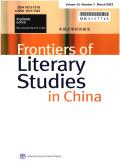斗争记忆、复合时间性与鲁迅文学空间的拓展
IF 0.1
4区 文学
0 ASIAN STUDIES
引用次数: 0
摘要
本文考察了鲁迅作品中记忆的建构方式,尤其是鲁迅的杂文,通过一个与遗忘对立的艺术舞台。作者强调遗忘的首要地位,而不是传统意义上的回忆,是鲁迅紧张、悲剧的记忆原则的中心。作者认为,鲁迅通过将遗忘作为历史和政治内容的一个登记和形式空间,充分展示了他标志性的文体手法和习惯。因此,“为了遗忘而记忆”必须从字面上理解,也就是说,遗忘是一种强化和强化的社会抗议形式,尽管是现代主义的,而不是现实主义的;并通过这个充满压力和痛苦的时间性的内部空间。此外,作者还试图表明,遗忘也具有一种表征功能,这种功能与鲁迅的杂文同时作为诗学和编年史是相辅相成的。在鲁迅的回忆作品中,那些未能被压抑成沉默、绝望和遗忘的东西从存在的空虚深处呼啸而回,并将混乱和危险的历史经历重组为对现实的更有力、更亲密的包裹和模仿。因此,在鲁迅身上,现代主义对虚无的介入使历史自身的冲突、压迫和僵局结构变得明显,而这种结构同时代表着反抗和希望的形而上学。张旭东()美国纽约大学比较文学与东亚研究系,邮编:10003xz3@nyu.edu下载自Brill.com11/08/2019 03:57:09PM ia纽约大学《鲁迅的痛苦记忆、复合暂时性与文学空间的拓展》201本文章由计算机程序翻译,如有差异,请以英文原文为准。
Agonistic Memory, Compound Temporality and Expansion of Literary Space in Lu Xun
The paper examines the ways in which memory is constructed in Lu Xun’s writings, above all his essay (zawen) by means of an artistic staging of its antagonism with forgetting. The author emphasizes the primacy of forgetting, as opposed to recollection conventionally understood, as the centrality of Lu Xun’s stressful, tragic principle of memory. The author argues that, by turning to forgetting as a register of and formal spatial space for historical and political content, Lu Xun puts his signature stylistic maneuvers and mannerisms in full display. Hence, “memory for the sake of forgetting” must be understood literally, that is, as forgetting functioning as a heightened and intensified form of social protest, albeit in modernistic rather than realistic terms; and through this pressurized and agonistic inner space of convoluted temporality. Furthermore, the author seeks to show that forgetting also serves a representational function that goes hand in hand with Lu Xun’s zawen as poetics and chronicle all at once. In Lu Xun’s writing of reminiscence, that which fails to be repressed into silence, despair and oblivion roars back from the depth of an existential void, and reorganizes historical experiences of chaos and danger into a more powerful and intimate encasement and mimesis of reality. Thus, in Lu Xun, a modernist intervention into nothingness makes palpable history’s own structure of conflict, oppression and impasse which simultaneously stands for a metaphysics of defiance and hope. Xudong ZHANG ( ) Departments of Comparative Literature and East Asian Studies, New York University, New York, NY 10003, USA E mail: xz3@nyu.edu Do nloaded from Brill.com11/08/2019 03:57:09PM ia Ne York Uni ersi Agonistic Memory, Compound Temporality and Expansion of Literary Space in Lu Xun 201
求助全文
通过发布文献求助,成功后即可免费获取论文全文。
去求助
来源期刊

Frontiers of Literary Studies in China
Multiple-
CiteScore
0.10
自引率
0.00%
发文量
360
期刊介绍:
Frontiers of Literature in China seeks to provide a forum for a broad blend of peer-reviewed academic papers of literature in order to promote communication and exchanges between litterateurs in China and abroad. It will reflect the enormous advances made in China in the field of literature in recent years. In addition, this journal also bears the mission of introducing the academic achievements on Chinese literature research to the world. The coverage will include the following main branches of literature, both theoretical and applied: ancient Chinese literature, modern Chinese literature and contemporary Chinese literature.
 求助内容:
求助内容: 应助结果提醒方式:
应助结果提醒方式:


